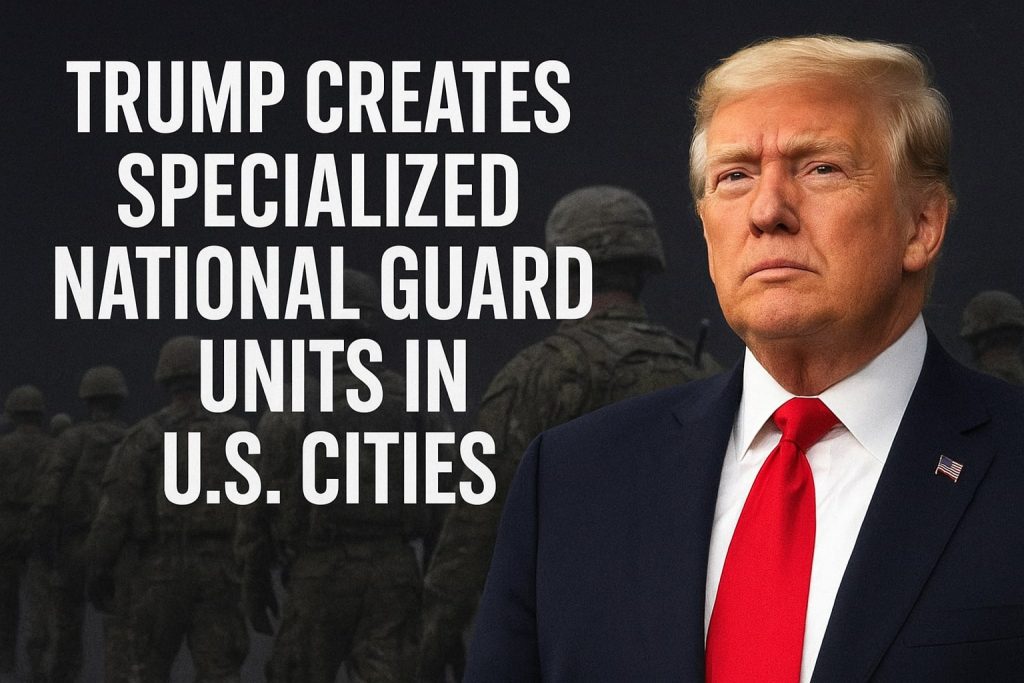
August 27, 2025 – President Donald Trump has signed a sweeping executive order establishing specialized National Guard units aimed at supporting local law enforcement in major American cities. The move, already sparking nationwide debate, could have significant implications for policing, civil liberties, and the federal government’s role in local security.
What the Executive Order Says
The executive order authorizes the Department of Defense, in coordination with state governors, to form specialized divisions of the National Guard. These units will be tasked with providing rapid response support to city police forces during protests, riots, or instances of what the administration describes as “widespread lawlessness.”
According to the White House, the order is designed to “enhance public safety” by giving mayors and governors additional tools to handle rising crime and civil unrest. The Trump administration insists the move is not a federal takeover of policing, but a way to “bridge gaps” between local enforcement and federal resources.
Why Trump Pushed for Specialized Guard Units
The decision comes amid ongoing concerns about violent crime in several U.S. cities. The Trump administration has repeatedly emphasized its “law and order” agenda, pointing to rising homicide rates and public safety concerns as justification for expanded federal involvement.
Supporters argue that many cities—especially those struggling with limited police budgets—need backup when crime spikes or when mass demonstrations overwhelm local departments. Critics, however, see this as an unprecedented expansion of federal power into local policing.
Cities That Could Be Impacted
While the order applies nationwide, analysts believe that cities like Memphis, Chicago, Philadelphia, Portland, and Baltimore may be among the first to see specialized Guard units activated. These cities have experienced spikes in violent crime or large-scale protests in recent years.
Governors would still need to approve deployment, but given Trump’s close ties with Republican state leaders, critics worry that Democratic-led cities could face political pressure to accept Guard involvement.
Supporters vs. Critics
Supporters Say:
- Improved Safety: More boots on the ground will deter violent crime.
- Rapid Response: Specialized units can react faster than traditional Guard deployments.
- Federal Resources: Cities gain access to training, intelligence, and equipment they otherwise lack.
Critics Warn:
- Militarization of Policing: Deploying Guard units could escalate tensions rather than calm them.
- Erosion of Local Authority: Cities may lose autonomy over their own policing strategies.
- Civil Liberties Concerns: Expanded Guard presence could infringe on free speech and assembly rights.
Civil rights groups, including the ACLU, have already signaled plans to challenge the executive order in court, calling it a “backdoor federalization of law enforcement.”
Political Fallout
The move is highly polarizing in Washington. Trump’s allies in Congress praised the decision as “bold leadership” in tackling crime, while Democrats accused the President of “militarizing American streets for political gain.”
The executive order is also expected to play a major role in the 2026 midterm elections, with Republicans framing it as a crime-fighting measure and Democrats rallying against what they call “creeping authoritarianism.”
What Happens Next?
Implementation will depend heavily on how governors and local leaders respond. States with Republican governors may move quickly to adopt the specialized Guard units, while Democratic-led states could resist or even sue to block the order.
Meanwhile, the Pentagon faces the logistical challenge of training and equipping these specialized units—raising questions about costs, readiness, and oversight.
Conclusion
Trump’s executive order creating specialized National Guard units represents one of the most controversial law enforcement policies of his presidency. While the administration frames it as a necessary step to restore order in crime-ridden cities, opponents warn of dangerous consequences for democracy and civil liberties.
With legal challenges looming and political battles intensifying, the coming months will determine whether this new security strategy reshapes policing in America—or becomes another flashpoint in the nation’s deepening political divide.



